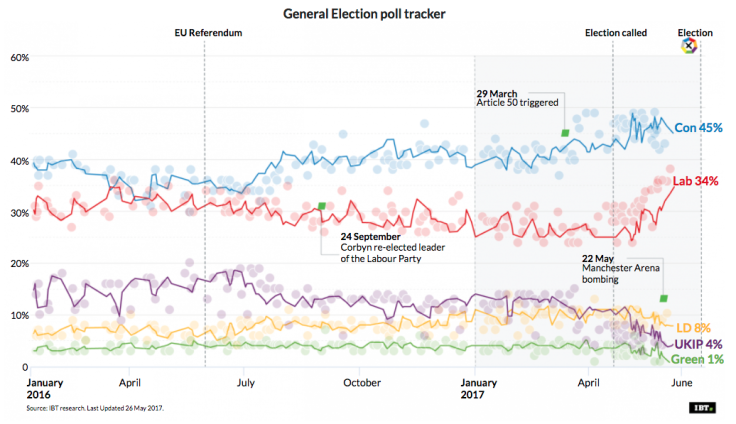Betting exchanges surge in popularity as Britons take a punt on election forecasts
Bookmakers expect a combined £30m to be placed on the British general election
From football to horse racing, golf and even tiddlywinks, there is little Britons don't like to have a flutter on. Over the last few years, however, the UK's topsy-turvy election cycle has turbo-charged a whole new market.
Betting on politics is now a massive business in Britain. Ladbrokes estimates some £30m will be gambled on the upcoming election in June - and the number of markets to bet on has grown exponentially from just a few years ago.
The days when punters could only guess which party would win the race to Downing Street are long gone. Among a myriad of options, these days customers can bet on the number of seats each party will win, turnout or the size of an overall majority.
Speaking to IBTimes UK, political betting expert Graham Sharpe said: "There are now literally hundreds of side markets for political pundits to become involved in. Political betting is a real growth market."
The introduction of betting exchanges has further widened the pool of options at customers' disposal. Compared to bookmakers, exchanges are much cheaper because there is no margin built into the odds. Therefore, the markets are more transparent - because you are not betting against the 'bookie' - and give a much better indication of the true implied probability of all outcomes.
Punters can still simply back an outcome like they would with a bookmaker, but exchanges offer them the chance to "sell" their position - betting against a certain outcome - should they wish to do so.
Betting exchange Smarkets has so far seen a combined £600,000 bet on the general election, but expects the figure to increase sharply.
"We had £5m traded on Brexit and Trump last year and then £2.5m on the French election," Smarkets press spokesman Pascal Lemesre told IBTimes UK.
"The election [figure] will get into seven figures across all the different markets soon and then we'd expect to see more volume as the election gets closer."

According to Smarkets, and as off 26 May, the latest implied probabilities to gain the most seats are 95% for the Conservatives and 5% for Labour, which suggests it would take a monumental swing for Corbyn's party to seriously derail the Tories. This comes despite a recent apparent surge in the polls for Labour.
Although there has been a mini surge in the market for 'No Overall Majority', the Conservatives are still heavy favourites to claim a majority, with their odds currently at 91%, slightly down from a previous high of 96%.
"Like with the most-seats market, the bulk of the big trades have involved the Conservatives, with one trader selling £900 on a Tory majority — he stands to win £10,000 should it be a hung parliament or any other majority," added Lemesre.
When it comes to the size of the Tory majority, which will be crucial for May as she seeks to negotiate the Brexit deal, the market is fairly evenly priced, with all five 25-seat bands covering the 75–200 range between the 10–14% mark.
Punters don't always back the favourite
Katie Bayliss from Betfair said the company has seen over £14m bet on the election, with over £9m going towards the most-seats market and the remainder being staked on the overall-majority market.
The overwhelming majority of bets is going towards a Tory win, with 94% of punters backing May to remain at Downing Street. However, the trend is not always mirrored across the industry.
"What British bookmakers have seen in recent political betting markets is a relatively small number of hefty bets for one side on equation, and large numbers - if far more modest bets - on the other," added Sharpe, who spent three decades at William Hill.
"This has made it tricky for odds-makers to bet by expressing their own opinions through the odds and left them struggling to make a balanced book."
The latest poll from YouGov published on Friday (26 May) showed the Conservative Party's lead has been cut to just five points, but Theresa May remains the clear favourite to win the elections.
However, at the 'traditional' bookmakers, Labour's recent surge has had an impact. The betting for the Conservatives to win the most seats at the election has gone from 1/100 to 1/20 at William Hill, with Labour halving in price to win the most seats from 16/1 to 8/1.
"Bookmakers' odds have a big margin built in, so they always tend to be a bit shorter," explained Lemesre.
"Also, they set the odds themselves so if they've had a ton of bets on Labour then they'll cut the price. Exchange markets are determined purely by people trading them and the wisdom of the crowd, not just one bookmaker's trading team."
Meanwhile the Tories are now 1/9 to win with a majority, compared with 1/33 a few days ago, whilst a Labour majority has been cut from 25/1 into 11/1.
"The Conservatives remain very strong favourites but a landslide victory for them is perhaps looking far less certain," said William Hill spokesman Rupert Adams.
© Copyright IBTimes 2024. All rights reserved.






